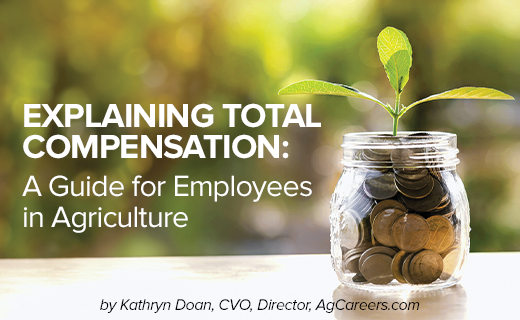- Candidates
- Login
- Set Up Account
- Create a Job Alert
- Search Tools
- Resources
- Employers

Discussions about salary and benefits are inevitable in the employment process. As an employee, it is essential to understand the entire compensation package during the job search process and throughout our entire career—not all compensation packages and extra perks are created equal.
In the whirlwind of a busy workplace, conversations about compensation often linger in the background, yet they hold significant weight for every employee, especially in the agriculture and food sectors. It’s easy to overlook the intricacies of what constitutes our pay and benefits, but understanding the total compensation package is crucial for our financial well-being and job satisfaction.
Consider this scenario: A former staff member jumps ship for a new job promising higher pay, only to realize later that they’re actually earning less. It sounds perplexing, doesn’t it? Surprisingly, such situations are more common than one might think. Not everyone possesses an innate affinity for numbers. Therefore, it’s in your best interest to ensure that you have a comprehensive understanding of your compensation plans and fully recognize the extra perks you receive for being an employee with your organization.
Compensation encompasses far more than just a paycheck; it includes numerous benefits and perks that add value to our work. By comprehending these components, we gain clarity and assurance about what we receive in return for our efforts.
EMPLOYEE BENEFITS IN THE U.S. AGRICULTURE & FOOD INDUSTRY
Better benefits are one of the top steps U.S. agriculture and food employers use to compete against other employers and a more common strategy than higher compensation. Employers also utilize additional benefits and perks to retain staff and keep them motivated.
-AgCareers.com HR Review, U.S. Edition
When evaluating a comprehensive compensation package, looking beyond the salary to the non-monetary perks is essential. We often focus on salary, incentives, and benefits; however, studies show that non-monetary perks can have a longer-lasting impact on employees’ motivation and satisfaction.
Non-monetary benefits, such as extra days off, team meals, health and wellness challenges, and volunteer days, can significantly contribute to a positive work environment. Keeping these perks simple ensures they are well-received and easily integrated into employees’ schedules. Perks can motivate employees to deliver high-quality work and reinforce their perception of fairness and equity within the organization.
So, what motivates you as an employee? Communicating our needs and preferences to our employers is essential, fostering a collaborative environment where our voices are heard. Ask your employer if there are parts of your compensation package you need help understanding.
Share your opinion on whether there are other perks and benefits that you would find valuable to have as an employee. Perhaps it’s an idea your employer hadn’t thought of that could add value to the team and keep the team positive and motivated.
Here are some additional insights into why understanding your total compensation package is vital:
ENHANCED JOB SATISFACTION
When we understand the value of our compensation package, we’re more likely to feel satisfied and fulfilled in our roles. Knowing that we’re being fairly compensated for our work fosters a sense of appreciation and recognition within the organization.
IMPROVED TRUST AND TRANSPARENCY
Employers who take the time to explain benefits and perks demonstrate a commitment to transparency and fairness. This communication fosters trust between employees and management and creates a positive work culture where everyone feels valued and respected.
OPPORTUNITIES FOR GROWTH
Understanding our compensation package opens opportunities for growth and advancement within the organization. By knowing what we’re entitled to, we can advocate for ourselves and negotiate for better terms when the time comes.
Knowing the full scope of our compensation package goes far beyond just our salary. It includes benefits, bonuses, retirement plans, stock options, and other non-monetary perks. This information helps give us a clear picture of our financial situation and allows us to make more informed budgeting decisions, saving for the future, and investing.
To effectively plan a career, you must ensure your compensation aligns with your career goals and current and future aspirations. This is essential for our financial well-being and job satisfaction. By decoding our pay and benefits, we empower ourselves to make informed career decisions and advocate for our needs within the organization.
You’ll find more helpful tips for understanding salary and your total compensation in the AgCareers.com online Career Success Library.
https://www.agcareers.com/career-success-library/
A TOTAL COMPENSATION CASE STUDY
Meet Brynn, a passionate software developer at Reid Grant Holdings, an agricultural technology company dedicated to advancing precision farming. As Brynn delves into her role, she realizes the importance of comprehending her total compensation package, which consists of various elements crucial to her financial stability and career growth.
By understanding her total compensation package, Brynn can make informed decisions about her career trajectory and financial future. It empowers her to maximize the value of her employment at Reid Grant Holdings and thrive as a software developer dedicated to revolutionizing agriculture through technology